Ray Abreu was born in the Dominican Republic in 1972. His parents, both Dominican, had four siblings. Ray’s father, uncles, and grandfather were all in the military, and his mother was a housewife. In 1980, the family emigrated to the United States in search of a better life and more opportunity.
They settled in New Jersey, where the boys excelled in school sports, especially track and baseball, for which they received college scholarships. Even so, Ray’s older brother joined the military, deployed to Iraq, and served in the Persian Gulf War. Having contracted Gulf War Syndrome, he was sent home, only to die shortly after his return. The family was devastated; for his part, Ray had always assumed he and his brother would grow old together.
The death of his brother quashed Ray’s long-held dream of enlisting. He skipped college and went to work for local police and fire departments; he also became a volunteer EMT for a local city and worked for Jersey City Medical Center EMS. Ray was called to the 1993 bombing of the World Trade Center to set up triage and transport the injured to hospitals. He remembers that “in a time of crisis like that everybody just worked together.”
By 1995, Ray had married. He and his wife relocated to San Jose, California, where their first child, a girl, was born in 1995. He began working as a bail bond agent. After a near-tragic incident, he left that job and began working for NASA at Moffett Field, where he was a federal law enforcement officer until 2005. At this point, with military service still on his mind, Ray decided it was now or never and joined the Coast Guard in 2005 at age thirty-two. Deployed to such places as Guantánamo Bay, Kuwait, and Colombia, he went on many classified missions, usually in two-man teams. After several years of witnessing horrifically violent scenes, Ray cracked. Post-traumatic stress was evident as were multiple physical injuries sustained in the service. He left the military in 2015, broken in body and in mind.
Ray’s psychotherapist referred him to Operation Freedom Paws, where Ray was soon partnered with and trained his service dog, Sunny. He is a standard gray poodle, a “career-change” dog that came from Guide Dogs of the Desert.
Sunny was pivotal in Ray’s life: a transformation was underway. While he still has challenges, Ray is no longer self-isolating, his temper is under better control, and he is working to better his relationship with his children. Ray is finding his way as he learns to live with post-traumatic stress, with Sunny at his side.
EXCERPTS FROM OUR CONVERSATION
Vicki Topaz: What happened after you signed up for the Coast Guard in 2005?
Ray Abreu: Actually, I joined the Coast Guard Reserve. I was too old join as active duty, but I was immediately put on active duty anyway. One of my deployments sent me to Guantánamo Bay, Cuba. That was a culture shock. I’d never been exposed to anything like that. I’d been exposed to criminals and violence but nothing like what I witnessed over there.
Can you say more about that?
I can’t really say much, except that in all the news back then, people said we were torturing and beating prisoners, but it was really the other way around. They were playing these mind games with us. That’s demoralizing for our young guys. It was basically on your toes 24/7.
What were you doing at Guantánamo?
I handled high-value assets, transport, escort, and so on. That’s when they built the new prison, where it was safer for us. They would have their own chef fly in every Thursday and cook their food for them, while our food was brought in on a barge—towed in by a tugboat that took twenty-one days to get there. By the time the barge got in, most of the food was spoiled.
You hear that prisons are the best breeding grounds for recruitment and for radicalizing people.
Well, that’s a totally different animal. We had to take extreme measures when the prisoners were moved from one place to the other because you didn’t know, anything could happen.
How long were you there?
A total of a few months. And then I came back to the States, even though the Army wanted to keep me there. I had to return with my unit.
I was part of a very special team for the Coast Guard PSU 312—a port security unit. We went through intensive training in swimming, weapons systems, and boats. Our job was to go in first and secure the ports. We ensured a high-value US port that Navy medical ships, destroyers, and submarines could safely transit. Then I became a liaison for the National Security Agency (NSA) with the Coast Guard, doing counter drugs.
Have you heard about the submarines the smugglers use? They make them in the jungle, they load them up with drugs, and they send them this way.
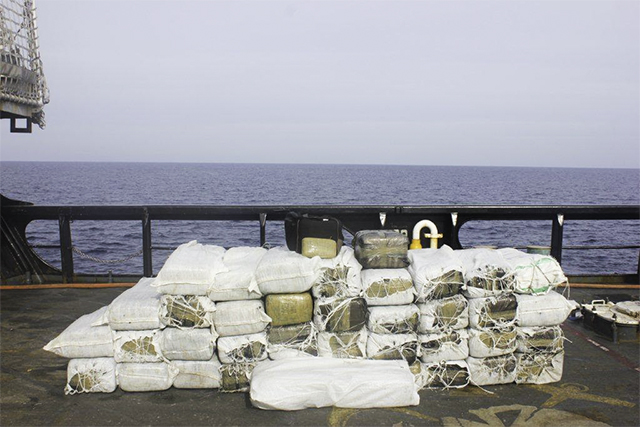
They use submarines?
That’s right, homemade submarines. They would go about twelve feet underwater, which made it hard for us to find them. We would jump right in the water and try to stop them at any cost. I liked it because I felt like I was doing something for our country—stopping drugs. Drugs are the number one thing that’s killing the US.
Were the drugs coming mainly from South America?
They come up the coast from Colombia, Ecuador. I went on countless missions. If you go on YouTube and search for “Coast Guard Law Enforcement,” you’ll see our boats chasing them. They’re running in the water, and we jump in on them. You’ll see one of our first videos.
Because of my Spanish, I became a linguist for the Coast Guard, where I was part of a two-man team. We would work on logistics in Mexico, Salvador, Costa Rica, and Panama to try to get assistance from them to avoid international incidents on the water. Partner nations worked very well with us. We got more countries on our side helping us out. We did good work, but I saw a lot of hard things along the way, things I didn’t want to do, things I can’t talk about.
That’s when I started getting my stress. I already had some of it from other missions.
So in this situation, you felt, “This is not right.”
“This is not right”—exactly.
Yet you were obligated to follow your orders.
Yeah. For instance, on one mission we witnessed the beheading of two people, one of them with a chain saw. And we couldn’t do anything about it. For me, it was that, right then and there: I knew I was done. That’s when I started closing off. That’s when I started being distant from people. That’s when I started losing sleep. That’s when my anger started, because I saw that—one person killed with a chain saw and another one butchered like an animal.
As time passed, I just became more and more angry. It took a toll. I started having issues with my kids. I wasn’t the same.
You were already sensing a shift in your feelings. Did you stay in the Coast Guard?
Yep, I was still in the Coast Guard. But I requested a job where I wouldn’t have to witness that stuff. I went into a unit of the NSA—I’ll let you fill in the blanks . . .
Would you see your kids while all this was going on?
When I was in the States and not on a mission, yes. But they wouldn’t know when I was coming back, because I wasn’t allowed to say anything.
For instance, I went on a mission where my partner and I met up with others and they put us in a plane. Once we were in the air, they started briefing us on where we were going and what we were going to do. Most of my work was with the DEA, the NSA, the FBI, and so on.
Because of the mission and classification, I felt like I couldn’t reach out to a therapist. I had no way to reach out and vent. All that stuff was just building and building. I felt I had to man up. But it got to the point where I thought, I can’t, I’m human. I broke down and went to the hospital. I’ve been to the hospital for breakdowns maybe four times.
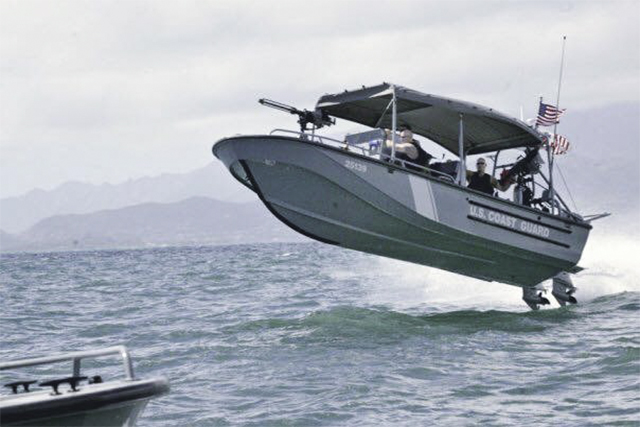
At various places?
At various places, and then here when I finally told the Coast Guard, “I can’t do it. Put me in an office.” But by then the work had already taken a toll on me. In 2013 and 2014, I started having issues with injuries I sustained from my deployment. I didn’t say anything, because I had to suck it up, man up. Because of the classification, I couldn’t tell what happened—so I had to tell them another story. I had both of my shoulders redone. I had two knee surgeries and two foot surgeries, which left me without feeling to half the leg and foot.
And this resulted from doing what was needed for the mission?
Exactly. And we couldn’t say anything. Again, we couldn’t go to the doctor and tell them what happened, because it was classified. So we had to say we got hurt doing something else. And my injuries started catching up with me. Maybe it was because I already had my mental breakdown and now my body was breaking down, too. It was one surgery after another.
Where did you have those surgeries?
I was still active duty, but I had the surgeries at regular hospitals.
And you don’t feel part of your leg?
I don’t feel it, because I had an impact. I got a mass or a tumor of some sort on my foot, and they had to remove it. So I had to learn how to walk again because the tumor touched the nerve that goes up through my leg to my back.
When was that?
May 14, 2015. I found relief outside Veterans Affairs, outside the military. That’s when my civilian therapist referred me to Operation Freedom Paws—OFP.
Things have changed since I met Sunny, my service dog. When they were bringing him out, I said, “I was supposed to be getting a dog—that’s a llama!” They started laughing. I love this guy. You have no idea how much he has helped me turn around. At first I wondered, What are people going to say? You know, walking around . . . But you know what? I don’t care. He has helped me, and at this point I don’t care.
You can see how big he is. But he’s so finicky with his food, with his snacks. It has to be his way or he won’t eat it. Or he’ll just stand there. Anyway, one day we just clicked, me and him.
How did your civilian therapist know about OFP?
From other veterans. She said she’d heard good things. She gave me a letter and I went to OFP.
At OFP I feel I can let my guard down. I know that I’m safe there and I don’t have to worry about anybody. It’s a big change. Even my kids say, “Wow, Dad, you have changed a lot!” And for that to come out of my kids’ mouths, that really showed me that I have changed. I’m more mellow now.
I don’t keep things away from my kids. I want them to be aware of the injuries. First of all, you don’t see the injuries. I want my kids to know in case I change. And they help me big time.
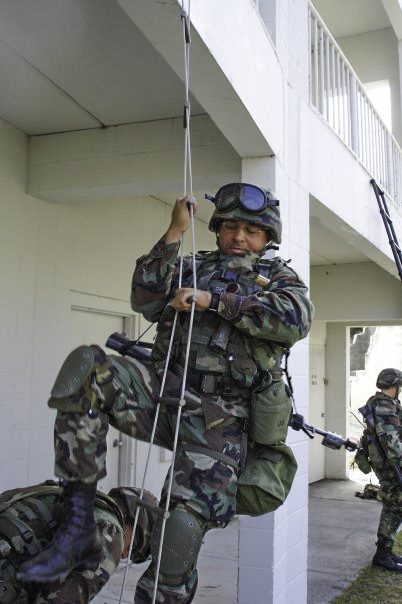
Are you getting help with physical pain?
I told Mary Cortani [founder-director of OFP] about my pain, and she referred me to a Vasper specialist. It’s free for the military. No charge at all. Have you heard of it? [Vasper (http://vasper.com/) is a method of pain control (anaerobic exercise) without medication.]
Yes, but I don’t understand how it works.
You sit in a machine with cold compressors for twenty-five minutes. It helps relieve the stress, helps you sleep, helps with the pain. I have not had the pain in my leg or in my hip like I had before.
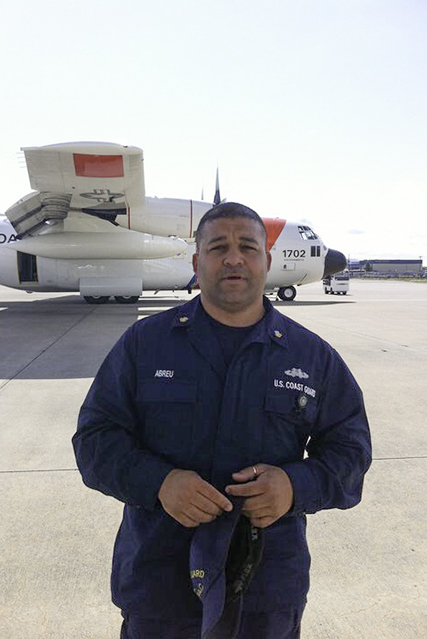
Do your kids live with you?
My daughter Josie—who’s twenty-one-years old—moved out. My sixteen-year-old, Arturo, goes back and forth to his mother’s, but he spends more time with me.
Do you go there regularly?
Yes, they prefer you go two to three times a week so you can really feel the difference—and trust me, you do. I felt it the first day.
I don’t want to stop, because I feel like I’m sleeping better, with less stress and better pain management. I know the pain will never go away. They told me I’m never going to regain the sensitivity in my leg and foot. So it is what it is. I will have to learn to adapt, overcome, and move on.
I have gotten more help from the outside than from our own government and the VA. They told me at the Vasper place that the VA does not recognize them. The VA will not refer to them. But at the Vasper place any veteran is treated free of charge. It’s at Moffett Field.
That’s really great.
I want more people to know about these things, the way I was referred to OFP.
And you’ve gotten relief.
I’ve gotten relief. Sometimes I feel sorry for Sunny because when I get like that he has to work extra hard to try to keep me calm. And you know, three, maybe four times he has moved from the back seat of the car to the front seat to try and help me calm down.
He does that when you get angry while driving?
Yeah, when I’m getting frustrated because of the traffic, Sunny will come over to me. He’ll put his head on my hand if I have it on the shifter. He’ll nudge me: “OK, I’m here.” I’m grateful for him and for OFP. There is nothing that I’ve asked Mary for and she doesn’t have a solution.
That’s why everything I see on Facebook about OFP I share with everybody. I even went to a fund-raiser to give a presentation. I’ll gladly go and show Sunny off to veterans or whatever’s needed—as long as we bring awareness to our veterans that it’s OK to come forward. We don’t have to be cooped up in a closet suffering, because there’s help out there.
After you were introduced to Sunny, you started going to classes for training.
A couple of weeks before I went, I’d had knee surgery, so I was limping. I was sitting down. Sunny didn’t know about the surgery. He came right up to my leg, to the knee, and he licked it. He put his head on it and he was there. I had goose bumps—look at me, I’m still talking about it now. Since then we’ve just been great.
I went from my “closed Ray” with my hat and shades to losing the shades one day. Then I lost the hat. At OFP, they saw me shedding my disguise. They saw me smiling more.
People could see the change.
They saw the change. And one day I woke up feeling the final attachment to Sunny. People had said, “Oh, it’ll take about eight months.” And sure enough, we just woke up one day and we were bonded. I told people about it when I went to training, and they were so happy. Whatever I tell him to do, he’ll do it—he’s mine.
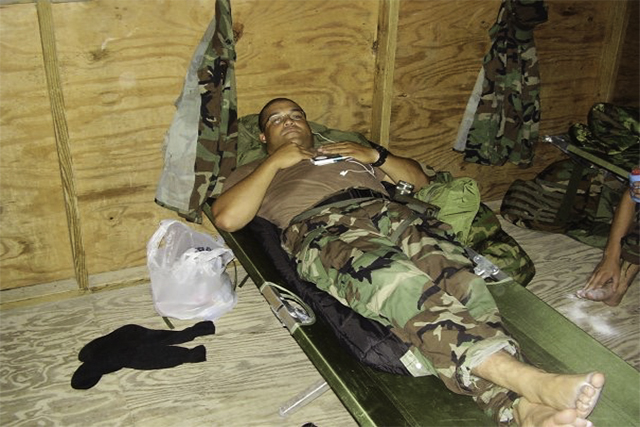
What are some specific ways he helps you?
Sunny knows when I’m uncomfortable, like with people, with a lot of people. He’ll let me know—he’ll walk around me. One time, there was a guy at a party who started getting loud with me. Sunny went right in front of me to block the guy. And then he pushed me back away from the guy, even though we had the kitchen island between us.
When it comes to me with people—he knows when I get angry, when I start getting antsy, when I start getting nervous. He knows, and he lets me know by nudging me. When I have nightmares and can’t sleep, he’ll bump the bed, or he’ll jump on the bed, and he lets me know he’s there. You have no idea how awesome that is.
I have sleep apnea. Sunny will bump the bed, and he’ll do it until I acknowledge him. Once I put the mask on, he’s fine. He reminds me to take my medicine.
He likes to snuggle. Like I say, he’s a big baby. Sunny’s my gentle giant, and he knows his side of the bed. I have one of those giant contraption beds that can lift up an arm or a leg. And it’s just me and him. He has his pillow and I have my pillow, and he puts his head where he can look at me. That’s the way he falls to sleep. I can’t ask for anything more.
When we flew to Miami, I put him on the airplane for a five-and-a-half-hour trip.
Tell me about that.
People had no idea he was on that plane. He was on the floor with us. It was just the three of us: me and my son and my daughter. Sunny just sprawled out. The people in front of us and next to us had no idea that he was there. When we landed, Sunny got up and people were asking, “Is that a stuffed animal? Can I touch him?” They were curious people, taking pictures with him. And they asked, “Where was he? Did they bring him to you?” I said, “No, he was here the whole time.” They said he was awesome. And even when we went through security.
How did it go at the San Jose airport and with security?
When we got to the airport and they saw me with him, they took me put me in a line by myself. I went through normally, and Sunny stayed behind with my son, who’s the other handler just in case. As they patted me down, Sunny just sat there looking at me. When I called him, he got up and walked right through like a champ, exactly the way we had practiced.
Boarding, the same thing, I went ahead of everyone else. They boarded me first, and it was not an issue. Sunny was fine. And when we landed at the airport in Miami, they had a doggie place for potty.
And what about coming home?
It was just as easy. Even in Miami he had no problem.
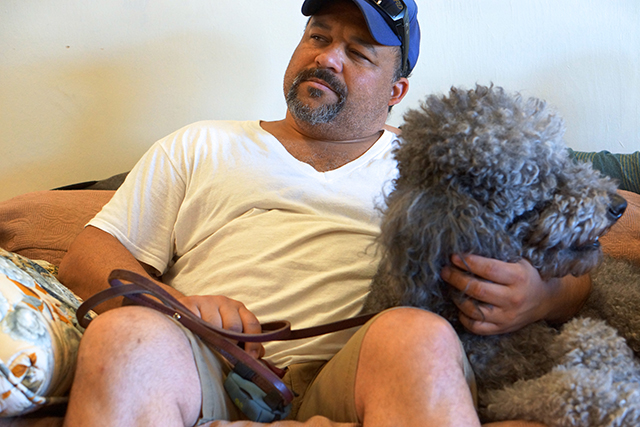
Did you go to Miami to see your parents?
Yes, we have a vacation house there, so we go every summer, all twenty-something of us. We go for a week or two and just have fun. We go to places there, or we just stay home.
Your family must have been happy to see you with Sunny and to see the change.
They were surprised. They were in shock. They were like, “Wow!”
Do you go to the VA for your medical needs?
Yes, I do.
Are you rated?
No, I haven’t been rated, nothing.
Does it take a lot of work to get rated, get the benefits?
It does and it shouldn’t be that way. It was easy to get us into the military. It should be easy to help us now. But I still would not discourage anybody who asks about joining. They have to make up their own minds.
Were you diagnosed with post-traumatic stress?
Yes. I have been diagnosed with post-traumatic stress and anxiety and some other things. I had to be rushed to the hospital a few times with chest pains and slurred speech, where one side was just like—I couldn’t talk, couldn’t do anything. It was just crazy. But I haven’t been to the hospital now in I don’t know how long. Even my headaches have diminished. I’m just glad I came across OFP. It’s been great.
You were having headaches?
You have no idea. I would stay home for days. I’m totally different now. Like I said, my parents, my kids, they have noticed a difference. It’s just unbelievable.
Do you have dreams for the future?
I just want to get off the medicine—that’s my goal. Get off the medicine and try to be as normal as possible without it. Of course, I can’t do anything about the pain meds. But it’s all the other medicine I’m taking—that’s my plan, that’s my goal, to get off it.
Is there something that you would say to veterans who need help?
That they’re not alone. And they need to seek help. Admit to it. There’s nothing wrong with it. Admit that they need help. We’re all human, so come and take care of it.
Was it hard for you to ask for help?
Yeah, at first, because I felt ashamed. But as soon as I got over that, I got help immediately. And that’s the way it’s supposed to be. There are things out there for them. There’s help.
#
RESOURCES | INFORMATION:
- ADA Requirements: Service Animals
- ADA Frequently Asked Questions
- Service dog and training provided by
Operation Freedom Paws - Photographs courtesy Ray Abreu.
